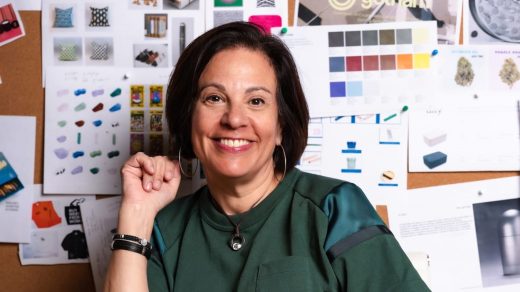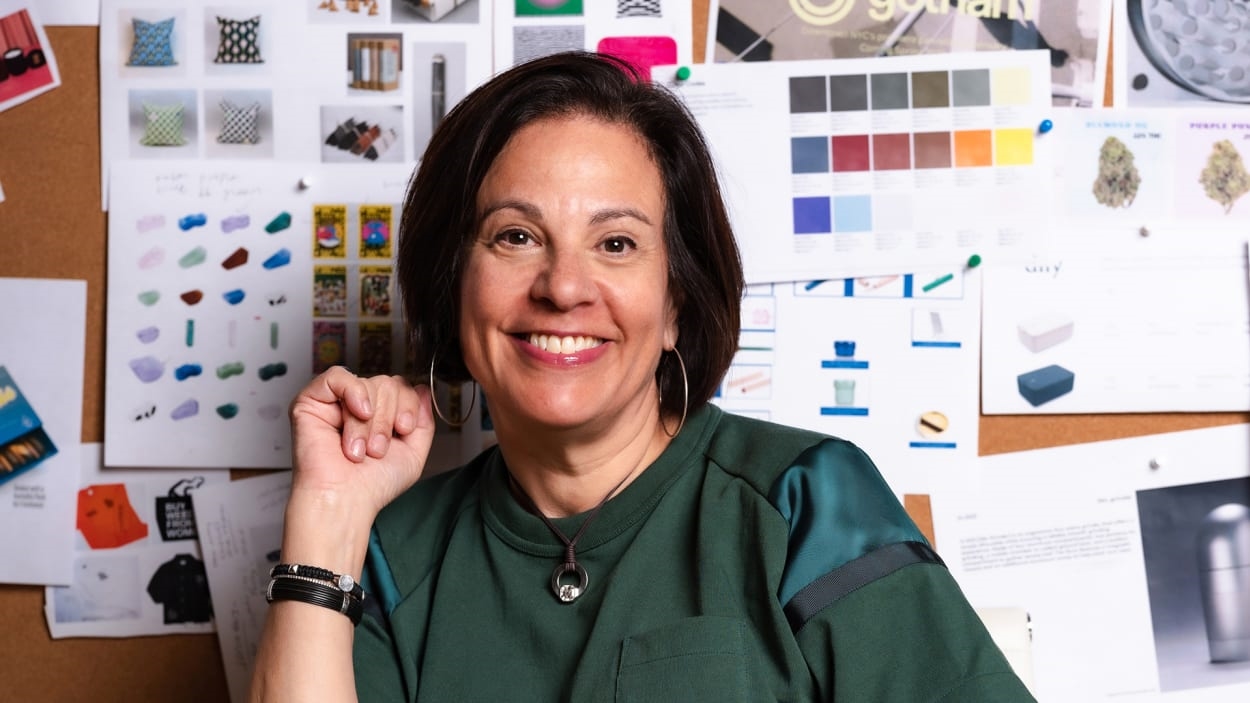Gotham Gal Joanne Wilson has built her dream startup, and it’s Colette for cannabis
Joanne Wilson remembers the first time she smoked pot. Mostly.
Wilson, the iconic doyenne of the New York tech world who has been a fixture since it was known as Silicon Alley and has invested in and supported dozens of startups, such as Food52, Parachute Home, and Blue Bottle Coffee, knows that it was almost 50 years ago. “It was one of those things where you had the cool high school siblings—not me, I was the oldest—and they have it, and you’d be like, ‘Yeah, I’ll try it,’” she says, recalling that this was when she was in eighth grade in Potomac, Maryland. “I was like, ‘Oh, I like this!’ Then I just always managed to figure out a way to have a nice supply.”
Did your parents smoke?
“My father, definitely not,” Wilson says. “My mother, when it came to high school, she would literally steal my weed,” punctuating the absurdity of this 1970s anecdote with her distinctive laugh, a kind of half-swallowed chortle that has a patrician, New York charm to it.
Wilson and I are discussing her introduction to cannabis because the self-styled “Gotham Gal”—the name of her longtime blog and investment firm—is opening one of the first state-licensed cannabis stores in New York City, named, of course, Gotham. The store is a love letter to her adopted home, particularly in the wake of COVID, where “I was watching all of these stores close, the destruction of New York City real estate,” Wilson says.
But it’s also a long-deferred dream, finally realized. “I’ve always had this idea for a store, literally since I was 21,” she tells me. She catalyzed this idea in her head into her senior thesis as a retail and finance major at Simmons University. “There should be a store where you walk in and you feel like you’re in someone’s home. You can sit there, you can have a coffee, buy—your children’s, your husband, your wife’s, your whatever—clothing, you can also buy the furniture. You can have a little lunch there. There could be candy . . . like, a great store. Of course, I had no money, right? I couldn’t do this. And so instead, I went to work at Macy’s.”
In the ensuing four decades, Wilson has had an eclectic career. She’s been a department store buyer, built a “schmatta” business for an apparel manufacturer and a media one for a young hustler named Jason Calacanis, and invested in well over 100 companies, with a focus on backing women founders well before anyone else was. She’s helped get technology into New York City public schools, and she sits on the board of the High Line. She’s building sustainable housing in the city.
But getting into the legal cannabis business is a new challenge. “People tend to gravitate toward areas that they know,” Wilson told her fellow investor Mark Suster in 2011. “Put yourself in a position to learn things you don’t know.”
The road to being a cannabis entrepreneur
Avid fans of Wilson’s blog first got notice that she was interested in cannabis in early 2016, when she went to California and got her medical marijuana license. “The stores are all regulated. You have to show your drivers license and your issued license from the doctor. Then you are given access to the backroom where you can purchase weed, hash oil, edibles, accessories etc.,” she wrote. “The weed is off the charts giving you the best high you can get. Regulation has many upsides.”
About a year later, a book by the journalist Joe Dolce, Brave New Weed, opened Wilson’s eyes to the long history of fear-mongering about cannabis in the wake of the repeal of alcohol prohibition in the 1930s as well as incontrovertible data as to its benefits. “The narrative that has been foisted upon the entire American public about cannabis has been a pack of lies, starting with Harry Anslinger,” Wilson tells me when I bring up the book, referencing the man who ran the Federal Bureau of Narcotics from 1930 to 1962. “If you go into [Brave New Weed], you’re gonna see the research in Israel is so much [more than in the United States]. You go to a store, and you can be like, I have breast cancer. Or I have this. They’re literally narrowed down what you should be taking. We haven’t done that. Why? Because we listened to this nonsense.”
At the same time, at the beginning of 2017, in a post titled, “What’s ripe for change?,” Wilson signaled that she was very interested in investing in consumer cannabis companies, particularly California ones because of the size of the market opportunity even within the state. “I started looking to invest in consumer-type products,” she tells me, “but I will say—and we are certainly going to see a tremendous falling out of the brands—that most of the people who are getting into making brands were just not great businesspeople, and not even great branding people. But I invested in a couple of companies that I thought were worthy.”
She funded a startup called Beboe, which created a line of high-end vapes and edibles that inspired The New York Times to call it “The Hermès of Marijuana,” and another one called Octavia Wellness, which targeted baby boomers. Thanks to Octavia’s program of having education-focused parties in senior communities, it earned the moniker “the Mary Kay for Marijuana.” (As you can see from the headline of this story, I am also not immune to the alliterative analogy when writing about this space.)
Beboe was acquired in 2019 by Green Thumb Industries, and Octavia Wellness “went under,” Wilson says, though the brand was picked up by another rollup of cannabis companies, Caliva, also in 2019. For all of Wilson’s ardor, the category remained a mess, suffering a lack of investment—most limited partners that invest in venture capital prohibit backing cannabis companies because it’s illegal at the federal level—and a dearth of the kind of entrepreneurs she liked to back. She had visited MedMen (Adweek called it “the Apple Store of weed”), declaring it “antiseptic” and the products “okay, not great.” Everyone’s smoking something, and yet even the industry’s giants, to her mind, were “so in over their head, they have no idea what they were doing.”
Burned out on early-stage investing, Wilson returned to her long-simmering retail idea. “If we really want to change the narrative around cannabis, let’s create a neighborhood store,” she says. At this point, cannabis was not even legal in New York, though it appeared to be headed that way, and all the things that she could take for granted with her portfolio companies—from payments infrastructure to online payroll software—were hurdles for cannabis companies.
“I was talking to my son about it, and he said, ‘Why don’t you think about it as a passion project?’ And I was like, well, that kind of puts a different head on your shoulders.”
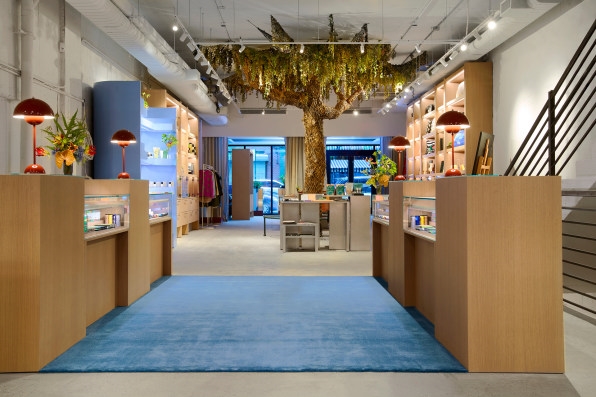
Gotham City
It’s Thursday, May 11, and New York is enjoying one of its handful of perfect spring days, with the sun shining and the temperature a still-pleasant high 70s. Walking past the trendy Bowery Hotel, where at 4 p.m. all the outside tables are filled with the casually dressed idle rich, I pick up the unmistakable smell of someone smoking pot. Across the street, just inside the block where a Sweetgreen anchors the corner, a black velvet rope extends from a glass storefront into the sidewalk, with a line queueing to enter.
This is Gotham.
It’s opening day, so not everything is dialed in as yet: I’m told that the lighting will get better, though it seems good; the mezzanine, which will be an event space and feature digital art, is still under construction; and not every item in the store has a discreet white-type-on-black chiclet displaying the price. Regardless, there’s an inviting vibe and a healthy crowd of shoppers. “Love” by J Dilla plays on the soundtrack at an appropriate decibel, and the air is perfumed, not with “flower“ but rather the fragrance of high-end candles from such purveyors as D.S. & Durga and 19-69.
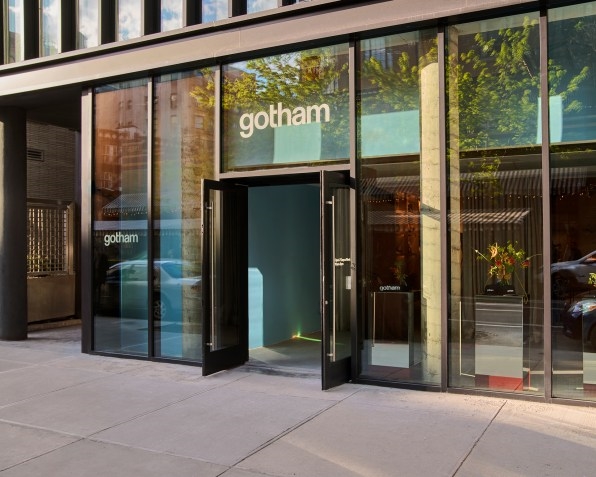
Those 19-69 candles declare themselves to be “bougie parfumée,” and Gotham, too, is both bourgeois and kind of sweet. Entering the 2,800-square-foot store, the focal point is a floor-to-ceiling tree sculpture around which there’s seating, with lifestyle merchandise lining both walls. The goods in this part of Gotham are meant to serve cannabis consumers directly—Houseplant ashtrays, bongs that look like artistic vases—but there are also products that are “canna-adjacent,” as Wilson says, obliquely connecting to their needs, whether it be better sleep or play or cooking. The store’s inspirations include the late, lamented French boutique Colette and the London-born fashion emporium Dover Street Market, which its cofounder has described as “beautiful chaos.”
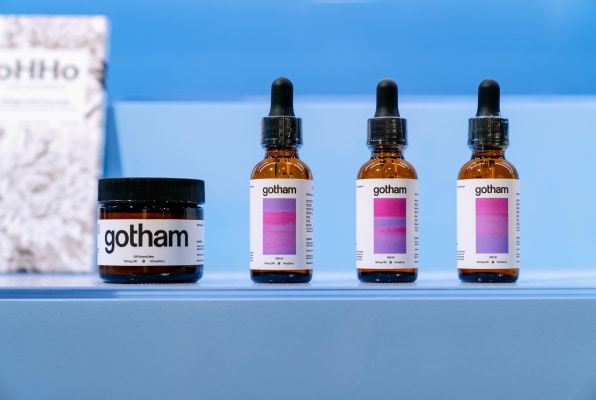
One need only cross the Bowery (to what I am going to assume is an unlicensed cannabis dispensary) to see the contrast that Wilson and Gotham are trying to create. The Goodies, black with pink neon and omnipresent pot-leaf branding, is garish and empty. “We initially didn’t want to have any product with pot iconography on it,” says Rachel Berks, Gotham’s director of merchandising, a retail veteran who founded an acclaimed Los Angeles boutique called Otherwild. But, she tells me, they did fall in love with a few pieces with that telltale leaf on it, such as the Leret Leret cashmere sweaters that feature the print.
Head toward the back, and there’s a subtle shift to the part of the store that sells the cannabis products, with the polished-concrete floor yielding to a soft blue rug, and with it, an atmospheric tweak from overhead track lighting to the diffused light of pendant lamps. Glass-topped, blond-wood cabinets house Gotham’s wares: Rose Delights gummies, Florist Farms rechargeable vape pens, Drew Martin pre-rolls, and Head & Heal tinctures, to name a few. The budtenders, wearing denim aprons with the Gotham brand stenciled in white, are patient and knowledgeable as they walk through the specific use cases and highs one can expect from each product.

For Wilson, Gotham is about more than the store itself. She partnered with Strive, a not-for-profit that helps incarcerated individuals, particularly from Black and brown communities, build a career path and avoid recidivism so that the same people wrongly and disproportionately impacted by the long 20th century madness about reefer could benefit from the upside of legal cannabis. The store sits at a spot in the East Village that, as Billy Richards, Gotham’s chief creative officer, points out, straddles the boom in high-end apartments on one end and the still somewhat gritty birthplace of a lot of New York City music, art, and culture on the other, making Gotham a pluralistic gathering spot.
“Retail’s dead, but when you go to Europe, it’s not dead. The stores are lively. They’re fantastic. Why can’t you do this here?” Wilson says. “I really feel like this is the next generation of retail. If it were up to me, I would have a place where you can smoke—and you can have an amazing dinner. You can buy cannabis, but you can talk to a healthcare professional about your pain. You can also go in and buy a great outfit for the weekend. People want to engage with other human beings.”
(13)

